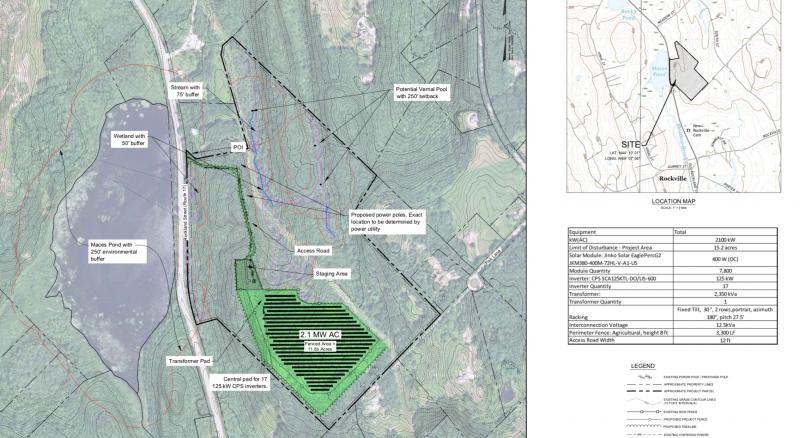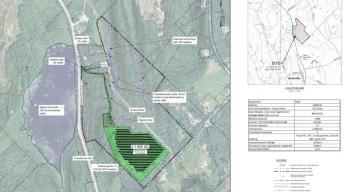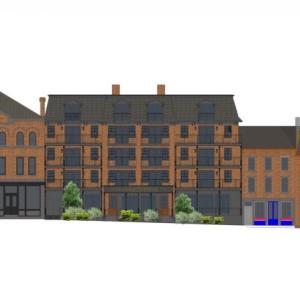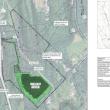Rockport to consider 15 acre utility solar project proposal, continue review of Village hotel plans
ROCKPORT — A new limited liability company established in mid-October, Samoset Solar LLC, hopes to generate electrical power with a proposed solar farm sited just off of Route 17 near Maces Pond. Samoset Solar LLC asking the town’s permission to develop 15 acres for the project.
According to the parent company proposing the project — Pine Gate Renewables, of Ashville, North Carolina — the lot is “recently harvested forestland,” and has a right of way, “thus lessening the need for tree clearing to construct the project.”
Pine Gate Renewables describes itself at its website: “As a solar farm developer with national reach, Pine Gate Renewables is a company with an eye on the future. We are intent on contributing to the broad transformation of our nation’s energy model because we believe clean, renewable power is both sensible and practical, and that locally-generated clean energy is not merely an alternative, it is the only way forward.”
“The project site is located off Rockland Street (see attached site plan) and will cover less than 20 acres, thus not requiring a Site Location of Development Act (Site Law) permit,” according to a cover letter from Dale Knapp, a principal at Boyle Associates, environmental consultants based in Portland, and who is advising the North Carolina company.
As yet, there are no identified customers, or “subscribers,” of the solar power generation, as the Maine Public Utilities Commission is still making rules for the state’s distributed generation procurement program, which was the result of the maine Legislature’s enactment of “An Act To Promote Solar Energy Projects and Distributed Generation Resources in Maine.”
That law created the competitive procurement program for distributed generation off renewable energy.
“During the last legislative session, a diverse group of businesses, towns, and clean energy advocates advanced LD 1711 to establish regulatory predictability for the solar industry and the use of competitive markets to reduce energy costs for Mainers,” wrote Knapp, in his letter. “The bill, as signed into law by Governor Mills, is designed to maximize benefits to both ratepayers and municipalities in addition to making it easier to invest in solar, especially for commercial and municipal energy consumers.”
In order to get in on this new state-created market, applicants must have their permits in order, but the companies building the energy projects cannot enter into agreements with potential subscribers prior to completion of the PUC’s rule making, said Knapp, in a Nov. 18 phone conversation.
According to the preliminary application filed at the town office: “The design appropriately avoids and minimizes wetland impacts to the greatest extent practicable. Also, the site is comprised of recently harvested forestland and a right of way, thus lessening the need for tree clearing to construct the project.”
To site the solar farm, Pine Gate Real Estate LLC, also based in Ashville, North Carolina, would lease up to 46 acres from landowner Alexander Krause for an initial 246 months with four successive renewal terms of five years each.
A photovoltaic array would be constructed on the land using a ground-mounted system and be surrounded by an eight-foot fence.
“Solar projects have already been successfully sited and permitted throughout Maine. Some municipalities are actively encouraging solar developers to site projects in their communities,” wrote Knapp, in a cover letter to the Rockport Planning Board. “Solar projects are very low impact in nature and are not considered impervious by the Maine Department of Environmental Protection (DEP). The racking consists of steel piles driven into the ground and ballasted foundations are not typically required. When the useful life of the project ends, it is decommissioned and the site is returned to its natural state. The parcels would be suitable for other uses and does not carry any permanent impact or alteration of the land.
Knapp said that his company, Boyle Associates: “has been supporting Pine Gate with environmental due diligence and the development of a proposed site plan. We have performed multiple site visits including a formal wetland delineation.”
The letter concluded: “We believe there is room for appropriately sited utility-scale solar projects in Rockport and are looking to the Planning Board and the Code Enforcement Officer to provide direction on the appropriate next steps.”
See attached PDF for full application to the Rockport Planning Board.
Rockport Village Hotel
The Rockport Planning Board will continue its review of a proposed five-story, 35-room hotel at 20 Central Street in Rockport Village.
On Oct. 24, Marianne, Stuart and Tyler Smith appeared before the Planning Board and detailed their plans for the proposed hotel. They were joined by Will Gartley, whose firm Gartley & Dorsky Engineers drafted site plans and renderings of the proposed structure.
Read: Smiths outline plans for proposed Rockport Village hotel project
“The new hotel will be built on the vacant lot between the existing Shepherd Block (18 Central Street) and the existing Martin Block (22 Central Street) buildings,” according to the updated application submission letter, dated Nov. 12. “The hotel will be a 5-story brick structure as measured from the Central Street elevation. The façade of the hotel will be set back from the existing sidewalk, allowing for greenspace between the hotel and sidewalk. In addition to the hotel rooms and associated guest amenities, a public bar/restaurant will be located on both the Central Street level and top level of the hotel. The proposed project will result in a new non-residential or multi-family building, therefore requires site plan review, per the Rockport Land Use Ordinance.”
Reach Editorial Director Lynda Clancy at lyndaclancy@penbaypilot.com; 207-706-6657
Event Date
Address
United States




























